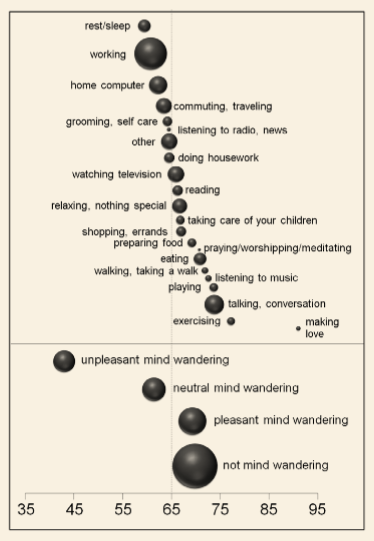Background Information
The human brain has a unique ability: it can think about things that aren’t happening right now. We can remember the past, imagine the future, or dream up things that will never happen. being able to think like this helps us learn, make plans, and be creative. However, in the absence of external stimuli or direction, we continue to think, or to experience
mind wandering
Mind wandering is the spontaneous shift of attention away from a current task or external environment to internally generated thoughts, memories, or fantasies. This common cognitive process is associated with default mode network activation and has been extensively studied in relation to meditation practices, which often aim to reduce mind wandering.
More on Wikipedia
View in glossary
or “stimulus-independent thought”
This study investigates how mind wandering affects our happiness. Historically this had been hard to study this because you have to ask people how they were feeling and what they were thinking about right at that moment, which is tough to do with a lot of people.
The most reliable method for investigating real-world emotion is experience sampling, which involves contacting people as they engage in their everyday activities and asking them to report their thoughts, feelings, and actions at that moment.
The authors performed experience sampling on a large number of people by using an iPhone app to ask people about their experiences at multiple, random times throughout the day.
What They Did
The data for this study came from a custom iPhone app developed by the research team. This app randomly prompts people to answer questions about their current activity, their mood, and whether they were thinking about something other than what they were currently doing.
For this analysis, task and mind wandering data from 2,250 adults were collected. These adults, with an average age of 34 years and predominantly residing in the United States (73.9%), were randomly prompted by the app to answer three key questions at various times during the day: how they were feeling right then (with responses on a sliding scale from very bad to very good), what they were doing at that moment (from a list of options), and whether they were thinking about something other than what they were currently doing (with options for yes or no, and if yes, whether those thoughts were pleasant, neutral, or unpleasant).
This approach allowed the researchers to collect a large amount of real-time data on people’s emotional states, activities, and the content of their mind wandering, providing a comprehensive look into how these elements interact in everyday life.
One Big Result
The study’s key takeaway is that the content of our thoughts — specifically, whether our mind is wandering and what it’s wandering to — plays a more significant role in determining our happiness than the actual activity we’re engaged in.
This conclusion is based on an analysis of the data from the app, which allowed researchers to capture real-time reports of thoughts, feelings, and activities from thousands of participants around the world.

Analysis revealed that people were generally less happy when their minds were wandering than when they were focused on their current activity. This was true even when the mind wandered to pleasant topics. Moreover, unhappiness was notably higher when the wandering thoughts were neutral or unpleasant.
the nature of people’s activities had only a modest impact on whether their minds wandered and had almost no impact on the pleasantness of the topics to which their minds wandered
The researchers also found that mind wandering accounted for a more significant portion of the differences in happiness levels than the actual task being done. Specifically, mind wandering explained 10.8% of the variance in happiness within individuals and 17.7% between individuals, while the specific activities people were engaged in explained a much smaller fraction of happiness variance.
These findings collectively indicate that the tendency of the mind to wander, and the nature of the thoughts it wanders to, have a more profound impact on our moment-to-moment happiness than the activities we are performing. This highlights the cognitive and emotional cost of mind wandering, emphasizing the importance of mindfulness and present-moment awareness for enhancing personal well-being.
McVay, Kane, & Kwapil (2009) previously demonstrated that mind-wandering represents a stable individual trait across contexts, suggesting these happiness effects may be consistent across situations. Research by Garrison et al. (2015) suggests meditation may specifically target the default mode network—a brain system associated with mind-wandering—offering a potential neural mechanism for cultivating present-moment awareness. Additionally, meta-analytic evidence from Zainal & Newman (2023) indicates mindfulness training enhances attentional processes, which may help reduce mind-wandering tendencies and potentially impact emotional well-being.
Miscellaneous Interesting Takeaways
Mind Wandering is Ubiquitous
This study is among the first to be able to examine mind wandering in the field, and one of the key takeaways is just the extreme fraction of time that people spend thinking off-task thoughts
The data showed that mind wandering is a common experience, occurring in nearly half of the recorded samples. This high frequency suggests that the mind’s tendency to drift is a pervasive aspect of human cognition.
This seems to be cited as a very routine result in modern papers, but in my opinion should still be considered to be a surprising fact about the human mind. In almost 50% of our waking lives our minds are taking us wherever they want to go, and not where we want to go.
Citation
Killingsworth, M. A., & Gilbert, D. T. (2010). A Wandering Mind Is an Unhappy Mind. In Science (Vol. 330, Issue 6006, pp. 932–932). American Association for the Advancement of Science (AAAS). 10.1126/science.1192439